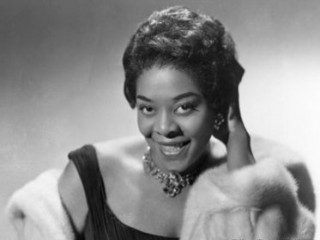
Dinah Washington biography
Date of birth : 1924-08-29
Date of death : 1963-12-14
Birthplace : Tuscaloosa, Alabama, U.S.
Nationality : American
Category : Famous Figures
Last modified : 2012-03-09
Credited as : R&B and jazz singer, The Queen of the Blues, Rock and Roll Hall of Fame
2 votes so far
Dinah Washington "was not just a creature of the blues," according to Betty De Ramus and Leslie Gourse in Ebony. "She could strut through jazz, slide through pop and break your heart with ballads." After singing with jazz great Lionel Hampton's band, she began a successful solo career in the late 1940s that lasted until her untimely death in 1963. Washington's hits include "I Only Know," "Time Out for Tears," and her greatest smash, "What a Difference a Day Makes." As De Ramus and Gourse elaborated, "Dinah Washington could work magic with a song, taking it apart and stitching it back together in her own quirky and moving way."
Washington began her life as Ruth Jones; she was born August 29, 1924, in Tuscaloosa, Alabama. When she was 3 or 4 years old, her family moved to Chicago, Illinois. By this time, Washington was already telling her mother she wanted to be a show girl, though her primary exposure to music was through church. When she was 8, her voice was strong enough to sing harmony with her mother, and she was learning to play the piano. Washington soon joined the church choir, and about the time she graduated from high school, she started serving as its director.
Meanwhile, Washington was learning more about secular music. She loved big bands, and for high school shows she often performed popular romantic ballads. Her mother disapproved of this interest, and frowned on the idea of Washington singing in local nightclubs; the young vocalist resolved this when, while still in her late teens, she married the first of her many husbands, John Young. After the wedding, she and Young lived with his parents, and she could fulfill singing engagements without her mother's approval. Wanting to maintain family ties, however, Washington often shared money from these early performances with her relatives without divulging her source of income.
For a short time Washington returned professionally to her gospel roots, singing with Sallie Martin's gospel group. But in 1943 she auditioned for Lionel Hampton's band and won a place. When she joined Hampton, she changed her name to Dinah Washington for professional reasons. While with Hampton's band, her musical efforts won her popularity among jazz fans, and by the late 1940s Washington had decided to pursue a solo career. Having already recorded with Hampton's band, she easily won a contract with Mercury Records.
Beginning in 1950, Washington was constantly topping the rhythm and blues charts. In that year she had several hits, including "I Only Know," "I Wanna Be Loved," "I'll Never Be Free," "It Isn't Fair," and "Time Out for Tears." Though she followed this feat with yet more success during the early 1950s, and was the best-selling female artist in the rhythm and blues genre at that time, her music did not cross over to white audiences. Washington had the frustrating experience of watching white artists have bigger pop hits with cover versions of songs she had recorded first--such as Kay Starr's rendition of "Wheel of Fortune," which had afforded Washington a hit in 1952. Washington's other rhythm and blues chartmakers of the period include "Trouble in Mind," "Fat Daddy," and "Teach Me Tonight."
Washington's recording career fell off somewhat during the mid-1950s, but she came back in a big way with 1959's "What a Difference a Day Makes." On this bluesy ballad, Washington broke racial barriers to ascend to the Top 10 of the pop charts. She followed "What a Difference" with a popular rendition of the standard "Unforgettable." In 1960 Washington got together with burgeoning singing success Brook Benton to record the album The Two of Us, which contained the pop hits "Baby, You've Got What It Takes" and "A Rockin' Good Way." She continued to have rhythm and blues hits in the early 1960s as well, such as "This Bitter Earth." Washington switched to Roulette Records in 1962, scoring a Top 40 pop hit with "Where Are You." As early as 1955 the vocalist had begun appearing in films--that year's Rock and Roll Revue and 1960's Jazz on a Summer's Day being notable among them.
In addition to having an affecting voice, Washington also possessed a forceful personality. She was not shy about calling herself "the Queen of the Blues." A friend recounted for Ebony' s De Ramus and Gourse a time when she was speaking to Washington on the phone while watching singer Lou Rawls on television. Noticing her friend's attention wandering, Washington rebuked her: "She's telling me she watchin' Lou Rawls and she talkin' to the Queen. Are you crazy for real?" Washington also had a tendency to call other women that she worked with "bitches." Nevertheless, she reportedly possessed a kind heart. Eddie Chamblee, one of Washington's husbands, told De Ramus and Gourse that "she would curse you out or she would curse out a club owner and then put a girl in the hospital for her to have a baby and pay all the expenses."
But Washington also had trouble controlling her use of diet pills. According to one of her pianists, quoted in Essence, the singer often gained weight and didn't know how to lose it again without the aid of pills. Chamblee explained further to De Ramus and Gourse: "Dinah would take pills, drink and forget she had taken her pills." He stressed, however, as have most other sources, that "her death was a pure and simple accident." Though she was not suicidal, Washington died of an overdose of diet pills on December 14, 1963.


















